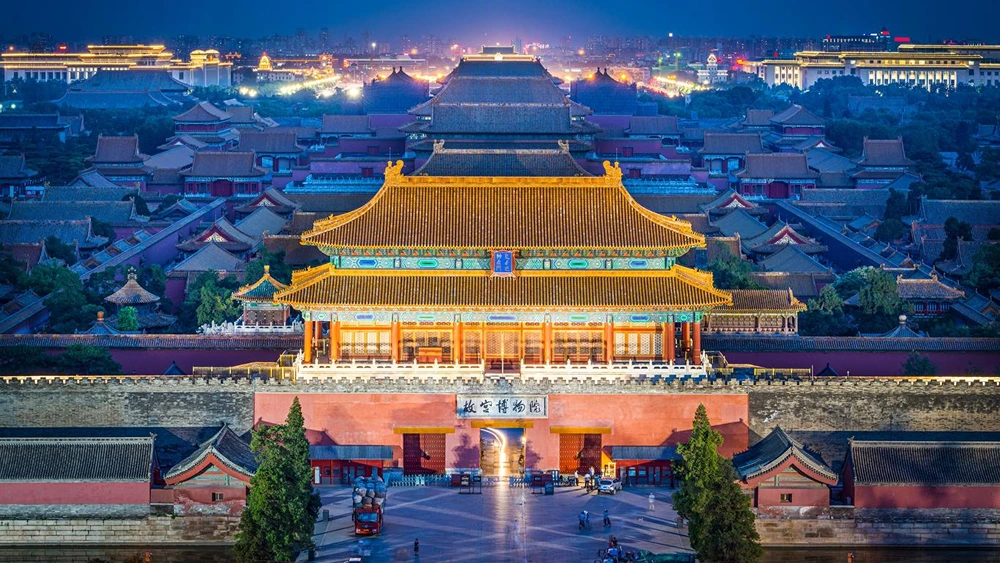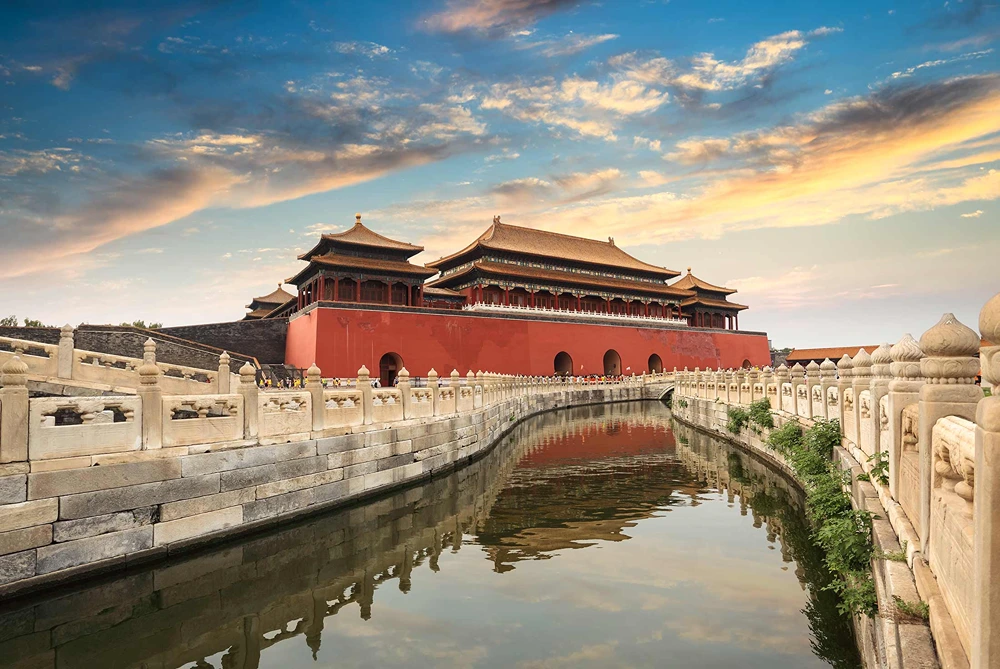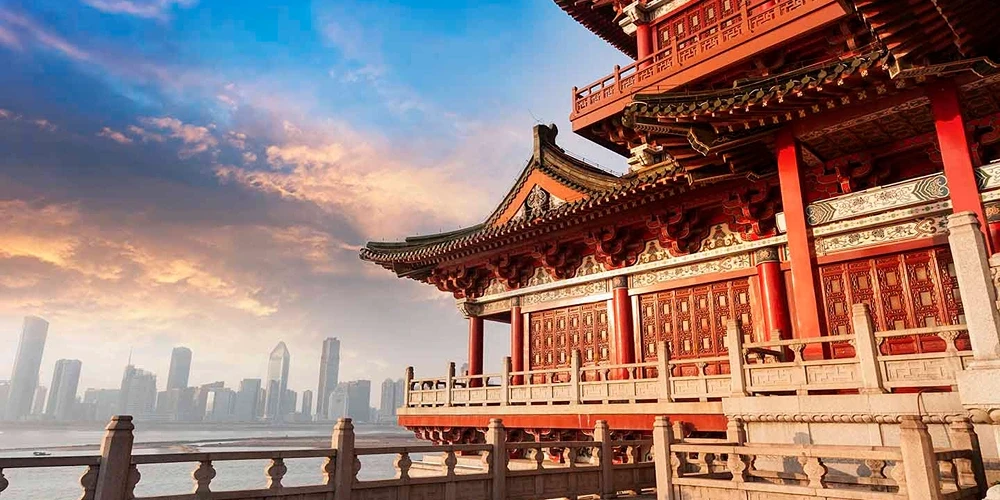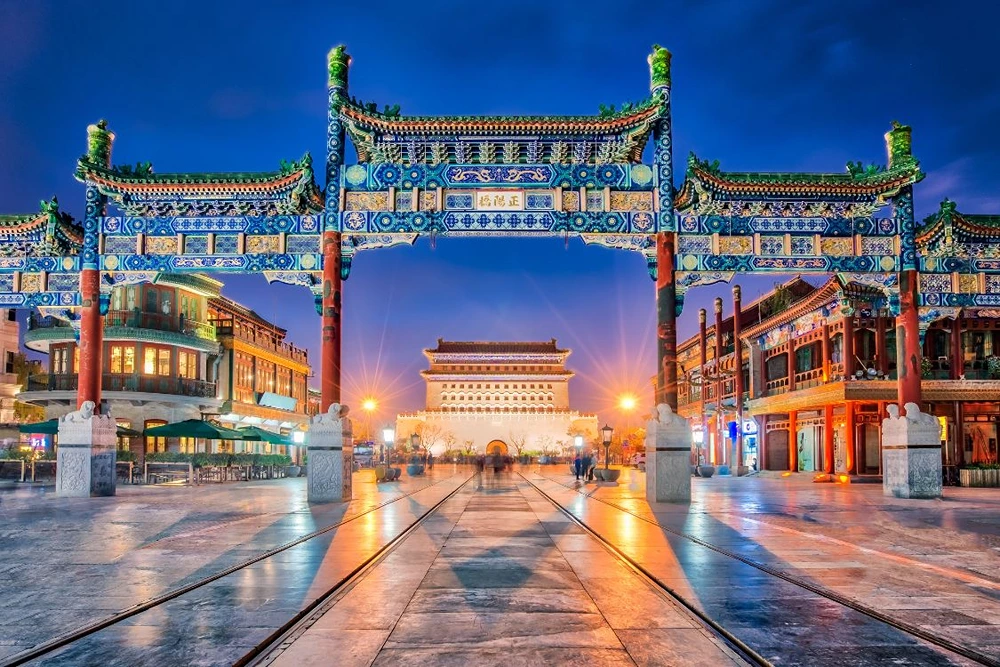Key highlights of Beijing:
- Rich imperial history spanning over 3,000 years
- Iconic landmarks like the Great Wall and Forbidden City
- Thriving arts and culture scene
- World-renowned cuisine, including the famous Peking duck
- Efficient public transportation system
- Gateway to exploring other parts of China
Travel Resources
- Flights: Find affordable flights to Beijing with our flight search tool to start your journey.
- Insurance: Ensure a worry-free visit with comprehensive travel insurance.
- Car Rental: Rent a car in Beijing for exploring beyond the city limits.
- Tours: Discover Beijing’s hidden gems with our curated selection of tours.
- Packing List: Don’t forget essentials like comfortable walking shoes, a pollution mask, and a VPN service!

Some History First
Beijing’s rich history spans millennia, shaping the city into a living museum:
- 1045 BC: First recorded as a city named Ji
- 221 BC: Unified under the Qin Dynasty
- 1271-1368: Served as the capital of the Mongol-led Yuan Dynasty
- 1406-1911: Capital of the Ming and Qing Dynasties
- 1949: Became the capital of the People’s Republic of China
Notable historical events:
- Construction of the Great Wall (various dynasties)
- Building of the Forbidden City (1406-1420)
- Boxer Rebellion (1899-1901)
- May Fourth Movement (1919)
- Hosting the 2008 Summer Olympics
Beijing Today
Modern Beijing is a global metropolis that showcases China’s rapid development:
- Population: Over 21 million inhabitants
- Economy: Major center for politics, culture, and international exchange
- Education: Home to top universities like Peking University and Tsinghua University
- Technology: Growing hub for startups and tech companies
Key sectors:
- Government and public administration
- Finance and business services
- Information technology
- Cultural and creative industries
Is Beijing Safe?
Beijing is generally considered a safe city for tourists and residents alike. However, as with any large metropolitan area, it’s important to exercise common sense and take standard precautions:
- Be aware of your surroundings, especially in crowded tourist areas
- Watch out for pickpockets in busy places and on public transport
- Use official taxis or reputable ride-hailing services
- Respect local laws and customs
- Air quality: Check daily air pollution levels and take necessary precautions
- Emergency numbers: 110 for police, 119 for fire, 120 for ambulance
Where is Beijing?
Beijing is strategically located in northern China:
- Situated on the northern edge of the North China Plain
- Coordinates: 39.9042° N, 116.4074° E
- Bordering regions:
- Hebei Province to the north, west, and south
- Tianjin Municipality to the southeast
- Nearby mountains: Yanshan to the north and Xishan to the west
Fun fact: Beijing is one of the oldest cities in the world and has been the political center of China for much of the past eight centuries.
Latest Articles
From The Area
What is the Best Time to Visit Beijing?
Beijing experiences four distinct seasons, each offering a unique perspective on the city:
- Spring (March to May): Pleasant temperatures and beautiful cherry blossoms
- Summer (June to August): Hot and humid with occasional rainfall
- Autumn (September to November): Ideal time to visit with comfortable weather and clear skies
- Winter (December to February): Cold and dry with occasional snow, offering a unique perspective on the city
Best months to visit: April, May, September, and October
Tips for visitors:
- Avoid national holidays like Chinese New Year and Golden Week, as attractions can be extremely crowded
- Check the lunar calendar for traditional festivals that might enhance your visit
- Consider air quality when planning outdoor activities, especially in winter
How to Get to Beijing & Around
Getting to Beijing:
- By air: Beijing Capital International Airport (PEK) is the main gateway
- New: Daxing International Airport (PKX) opened in 2019, serving as a secondary hub
- By train: High-speed rail connections to major Chinese cities
- By bus: Long-distance buses from neighboring provinces and cities
Getting around Beijing:
- Subway: Extensive and efficient metro system covering most of the city
- Buses: Comprehensive network, including sightseeing buses
- Taxis: Abundant but be aware of potential language barriers
- Ride-hailing: Apps like DiDi (similar to Uber) are popular
- Bicycles: Bike-sharing programs available for short trips
Pro tip: Purchase a Beijing Transportation Smart Card for convenient use across multiple transport modes.
Things to Do in Beijing
Discover top attractions and activities in Beijing:
- The Great Wall of China: Various sections accessible from Beijing, including Mutianyu and Badaling
- Forbidden City: Former imperial palace and now the Palace Museum
- Tiananmen Square: World’s largest public square and site of many historical events
- Temple of Heaven: Ancient imperial worship site with stunning architecture
- Summer Palace: Vast ensemble of lakes, gardens, and palaces
- Lama Temple: Most renowned Tibetan Buddhist temple outside Tibet
- 798 Art District: Contemporary art scene in a former industrial area
- Hutongs: Traditional alleyways offering a glimpse into old Beijing life
- Olympic Park: Site of the 2008 Summer Olympics, featuring the Bird’s Nest and Water Cube
- National Museum of China: One of the world’s largest museums
Don’t miss: Taking a traditional rickshaw tour through the hutongs for a unique perspective on Beijing’s history and culture.
Where To Stay In Beijing
Beijing offers a wide range of accommodation options to suit every budget and preference:
Luxury:
- The Peninsula Beijing
- Waldorf Astoria Beijing
- Rosewood Beijing
Mid-range:
- Crowne Plaza Beijing Chaoyang U-Town
- Novotel Beijing Xin Qiao
- Sofu Hotel
Budget:
- Beijing Downtown Backpackers
- Peking Station Hostel
- Leo Hostel
Best areas to stay:
- Dongcheng District: Central location with easy access to major attractions
- Chaoyang District: Modern area with embassies, business centers, and expat communities
- Xicheng District: Home to many historical sites and government offices
- Sanlitun: Popular for nightlife and international dining options

What To Eat In Beijing
Beijing’s cuisine is a delightful mix of imperial traditions and regional flavors:
Must-try local dishes:
- Peking Duck: Beijing’s most famous dish, crispy roast duck served with pancakes
- Jiaozi: Dumplings filled with meat or vegetables
- Zhajiangmian: Hand-pulled noodles with soybean paste sauce
- Lamb Hot Pot: Popular winter dish, especially in the Muslim Quarter
- Ludagun: Traditional sweet rice roll with soybean flour
Where to eat:
- Quanjude: Famous for Peking duck since 1864
- Baoyuan Dumplings: Colorful and tasty dumplings
- Huguosi Snack Bar: Traditional Beijing-style snacks
- Ghost Street (Gui Jie): Long street filled with restaurants, open late
- Wangfujing Snack Street: Try exotic street food and local delicacies
Pro tip: Don’t miss out on Beijing’s vibrant street food scene, but be cautious and choose vendors with good hygiene practices.
Entry & Exit Requirements
Visitors to Beijing must comply with China’s entry regulations:
- Visa: Most foreign nationals require a visa to enter China
- Check with the nearest Chinese embassy or consulate for specific requirements
- Some visitors may be eligible for visa-free transit for stays up to 144 hours
- Passport: Must be valid for at least six months beyond your planned stay
- Health: Proof of COVID-19 vaccination and negative test results may be required (check current regulations)
- Customs: Be aware of restricted and prohibited items
Important: Always check the most up-to-date information from official sources before your trip, as requirements may change.
What To Pack For Your Trip
Ensure a comfortable and enjoyable stay in Beijing by packing these essentials:
- Clothing:
- Layers for variable weather conditions
- Modest attire for visiting religious sites
- Comfortable walking shoes for exploring
- Travel adapter (China uses 220V, 50Hz with Type A and Type I plugs)
- Pollution mask or N95 respirator for days with poor air quality
- VPN service for accessing blocked websites (set up before arrival)
- Hand sanitizer and tissues
- Portable charger/power bank
- Reusable water bottle (avoid tap water)
- Basic medications and first-aid items
- Sunscreen and hat
- Translation app or phrasebook
FAQs
Check with the Chinese embassy or consulate in your country regarding visa requirements for China.
Don’t miss the Great Wall, Forbidden City, Temple of Heaven, and Summer Palace.
It’s advisable to drink bottled or boiled water to avoid stomach upset.




